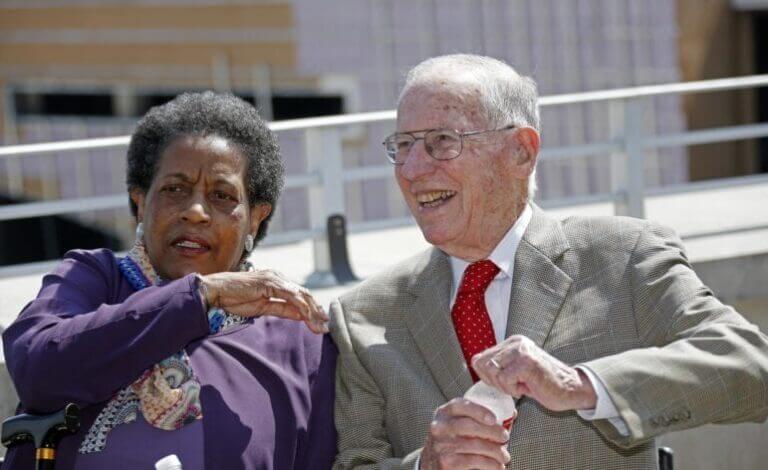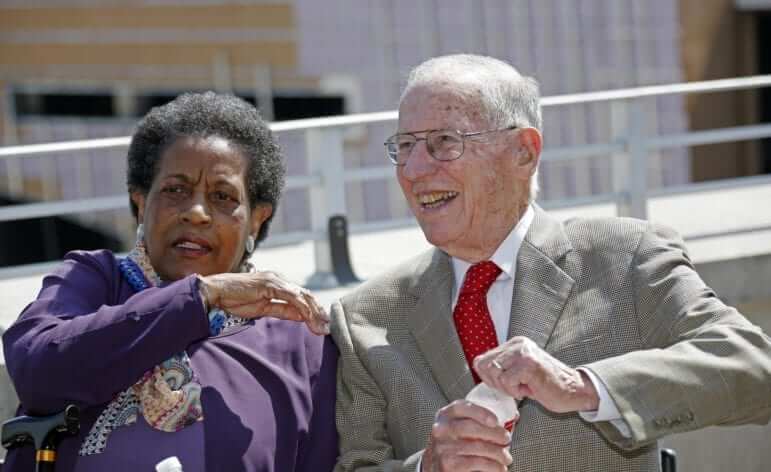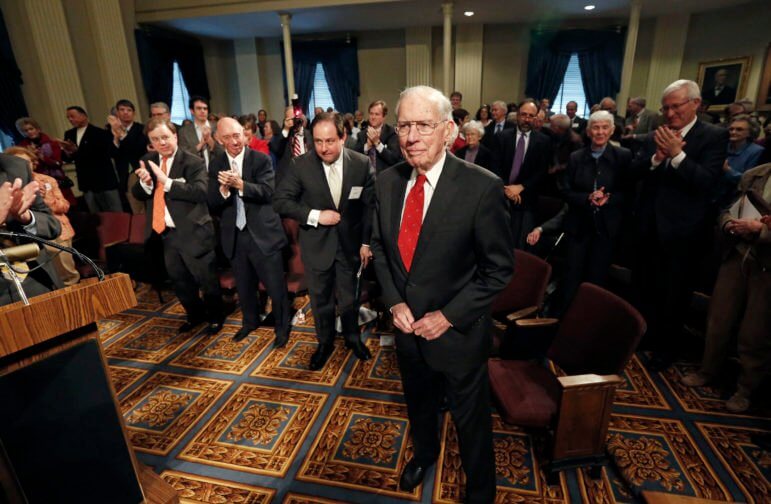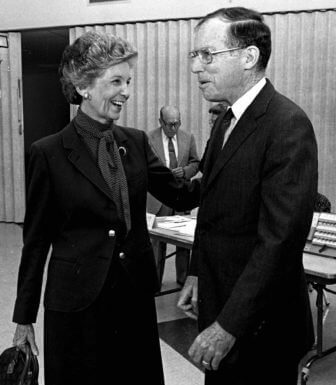

Former Gov. William Winter, right, and Myrlie Evers, activist and wife of the slain civil rights leader Medgar Evers, share a joke prior before a news conference on Thursday, June 11, 2015 in Jackson, Miss. (AP Photo/Rogelio V. Solis)
Former Gov. William Forrest Winter, widely respected for ushering sweeping reforms of Mississippi’s public education system and for his commitment to achieving racial equality, died on Friday evening. He was 97.
“The only road out of poverty runs past the schoolhouse door,” Winter famously said as he championed the Education Reform Act of 1982, heralded at the time as the most significant state education legislation since Mississippi created its public education system in 1870.
The act brought increased school funding and a teacher pay raise, created a compulsory attendance law, a school accountability system and publicly funded kindergarten among other reforms. It was a notable break from the state leadership’s racist apathy toward public education. About a decade earlier in response to federally mandated desegregation, a majority of Mississippi voters had approved a constitutional amendment that said the Legislature could dissolve the state’s public education system.
The late nationally syndicated columnist Carl Rowan wrote: “The greatest piece of civil rights, national security, and economic recovery legislation enacted this year does not bear any of those labels and did not come out of Congress. It is the bill enacted by the Mississippi Legislature to spend $106 million to give children of that state a more reasonable chance at a decent education and lift Mississippi out of the ignominy of being the worst-educated and most backward state in the union.”
Winter is survived by his wife of 70 years, Elise Varner Winter, and three children. The former governor fell at his home in 2017 in icy conditions that led to a deterioration of his health. Before then, he continued in his 90s to go to his law office almost every day.
Winter served as Mississippi’s 58th governor from 1980 to 1984, after two previous unsuccessful gubernatorial bids. He was the state’s 25th lieutenant governor from 1972 to 1976. Winter served as state treasurer from 1964 to 1968, and as state tax collector (a now defunct position) from 1956 to 1964.
“I think William Winter should be viewed as one of the greatest Mississippians,” said former Gov. Ray Mabus, who served as a legislative liaison and legal counsel on Winter’s staff. “His name belongs up there with (slain civil rights leader) Medgar Evers and (Nobel Prize-winning author) William Faulkner because of the immense impact he had.”
Mabus said the governor showed perseverance in passing the Education Reform Act.
“The Legislature kept turning him down, and he calls a special session (on the Education Reform Act) right before Christmas and we won,” Mabus recalled.
Winter was elected to the state House of Representatives while still in law school and served there from 1948 to 1956.
Winter never wavered in his support for public education, although in the 1960s — like nearly all white Mississippi politicians — he had voiced support for segregation. He later apologized for that stance and dedicated his career to achieving racial equality. After leaving public office, he served on the National Advisory Board for Race Relations created by then-President Bill Clinton. From that effort, the William Winter Institute for Racial Reconciliation was established at the University of Mississippi. That organization continues to operate as a nonprofit.
“He was the finest example of a Southern gentleman that I know,” U.S. Rep. Bennie Thompson said. “His mark was getting people of different persuasions, colors, ethnicities together and working things out. In Mississippi, he was the rarest of the rare. I can’t name another white politician that comes anywhere near his stature, Democrat or Republican. There are a lot of good politicians on both sides, but none measures up to William Winter.”
Winter was born in Grenada and was a graduate of the University of Mississippi law school. He served in the U.S. Army Infantry in the Philippines during World War II and was recalled to service during the Korean War. He served as a major in the Mississippi National Guard until 1957.

Rogelio V. Solis, AP
Former Gov. William Winter is given a standing ovation at the conclusion of a symposium on the Future of Mississippi and the South on his 90th birthday, Feb. 19, 2013 at the Old Capitol Museum in Jackson.
Winter’s entrance into statewide politics began when he was appointed to the vacant post of state tax collector by then-Gov. J.P. Coleman. Coleman had urged Winter as a state representative to run for House speaker against the powerful incumbent Walter Sillers. But Coleman got cold feet and abandoned the young lawmaker’s efforts, leaving Winter in a precarious situation. The governor appointed him tax collector as consolation.
Back then the state tax collector received a percentage of state revenue including the “black market tax” on illegal liquor sales. A Life Magazine article in 1962 declared Winter was the second-highest paid elected official in the nation, behind the president. The Legislature eliminated the tax collector position upon Winter’s recommendation.
“He was a dear friend and a great governor,” said longtime educator Andy Mullins, who, along with Mabus, was one of the so-called “Boys of Spring” who served on Winter’s gubernatorial staff, advising him on education and conservation issues. “He was a man of integrity, and most of all he was kind and treated everyone with respect.”
Mullins developed a lifetime friendship with Winter, visiting every Major League ballpark together.
Mullins said Winter “loved all things America, and he loved Mississippi.” He recalled when their baseball group traveled to San Francisco for a baseball game, they came across a gay pride parade. Soon afterward, Mullins said, Winter seemed in deep concentration. Mullins asked what he thought of the parade, and Winter looked up, smiled and simply said, “Isn’t America a great country?”
Winter’s work and legacy truly transcended politics, even in bitter partisan environments. “An unapologetic Democrat,” Thompson said, he earned the respect of politicians on both sides of the aisle — a rare feat that made him successful in pushing groundbreaking legislation, many of his closest friends and advisors said.
Even today, when Winter’s name or legacy is brought up at the Mississippi State Capitol, Republicans and Democrats alike on the House and Senate floors rise to give extended standing ovations.
“Governor Winter has always represented to me a person who cared more about what was best for Mississippi and not what he thought was best for him as a politician,” said Rep. Robert Johnson, D-Natchez and the current House Democratic leader. “Whether it was challenging Walter Sillers for speaker, pushing for transcending changes in public education or leading the discussions for changing the flag in the face of zealous resistance, he never wavered in his commitment to what he believed was right for Mississippi. He is a role model and an inspiration.”
Republican former Gov. Haley Barbour recalled Winter as a friend, “a gentleman, honorable and gracious.”
“While our politics didn’t always coincide, I’ve always admired him,” Barbour said. “He made great changes in the structure of Mississippi’s K-12 educational system … He and Mrs. Winter, who is a delightful, gracious lady, represented our state very well, both while he was in elected office and afterwards.”
Barbour, who at the time worked for the state GOP, recalled an airplane flight to Memphis in the late 1970s when Winter asked him to sit beside him.
“He was going to meet with a political consultant, from Arkansas, if I recall correctly, about whether he should run for governor,” Barbour said. “I told him, yeah, he ought to run, it was a good time to run following (former Gov.) Cliff Finch. He ran and won. He and I laughed many a time over the years that I’d encouraged him to run and he got elected as a Democrat and all that. I think part of the joke was that here was this twenty-something year old telling the guy about to be governor that, ‘I think you should run for governor.’”

AP file photo
Former Gov. William Winter, right, and his wife Elise talk after voting in the general election in Jackson on Nov. 6, 1984.
Winter’s last foray into Mississippi politics came in 1984, when he ran unsuccessfully against incumbent U.S. Sen. Thad Cochran. Since then, he stayed active practicing law in Jackson and as an ambassador for the state.
Mullins recalled campaigning with Winter for the Senate seat in 1984 and stopping at a pharmacy in southeast Mississippi. The pharmacist said he would not support Winter because he didn’t help his child get into medical school while he was serving as governor.
“Gov. Winter replied, ‘That’s just not how I operate,’ to which the pharmacist replied that he did operate that way,” Mullins said. “As Gov. Winter was walking out, he looked at me and said, ‘Put him down as doubtful.’”
Winter received numerous awards and accolades throughout his life as he continued to be a champion for public education and racial reconciliation after he left office.
Winter received the John F. Kennedy Profile in Courage Award, the Martin Luther King Jr. Memorial Award from the National Education Association, and the National Civil Rights Museum Award, among many others. The University of Mississippi named the William Winter Institute for Racial Reconciliation for him in 2003, and in the same year the Mississippi Department of Archives and History named its building for him.
One of Winter’s most impactful legacies in Mississippi was spearheading the effort to build the Museum of Mississippi History and the Mississippi Civil Rights Museum, the first publicly funded civil rights museum in America. He brought politicians of both parties to the table for those financial negotiations and was instrumental in securing public and private funds for the project.
“These museums stand at the intersection of William Winter’s greatest passions — history, education, and racial justice,” said Katie Blount, director of the Mississippi Department of Archives and History. “Generations of young people will come here to experience the stories that have shaped our state and nation.”
Barbour said that during his first term as governor, the push to build a civil rights museum hit a political impasse with some wanting it built in downtown Jackson and others wanting it built at Tougaloo College.
“It tripped us up,” Barbour said. “But Gov. Winter and (former state Supreme Court) Justice Reuben Anderson came to see me and proposed that we put not only the Civil Rights Museum but the museum of Mississippi history side-by-side up by the state Capitol. That won the day. People realized this was the best plan for the most impact and most visitation, and (Winter and Anderson) went out and worked just as hard as I did on it … I honestly believe that if it had not been for Gov. Winter and Judge Anderson, we couldn’t have gotten it over the line.”
Anderson, a close friend of Winter’s, recalled the former governor’s role in preserving and showcasing African American history of the state, even before the civil rights museum was built.
“With his encouragement, (the Department of Archives and History) strengthened its focus on African American history in Mississippi, acquiring significant collections of papers, mounting award-winning exhibits, and offering grants for the preservation of sites associated with African American history,” Anderson said. “Most notably, his close friendship with Myrlie Evers led to her decision to donate the Medgar and Myrlie Evers Collection to MDAH in 2002.”
Other living Mississippi governors offered their condolences.
“We are deeply saddened by the loss of former Gov. William Winter,” current Gov. Tate Reeves said. “He truly loved this state and his country. And the people of Mississippi loved him back. He will be missed by all of us.”
“Gov. William Winter is a legend in public service,” former Gov. Phil Bryant said. “Even though we represented different parties, he has been my dear friend for many years. Our common desire to make Mississippi a better place always brought us together. He will be remembered by all who knew him for his many contributions to public education and racial reconciliation. Gov. Winter has truly earned our respect and admiration. I will be forever grateful to have known this remarkable man.”
“Governor William Winter was a student of History and a clarion voice for a better future,” former Gov. Ronnie Musgrove said. “From a call for kindergartens, more support for our public schools and a change of our flag, his voice was for a new and better Mississippi for all. We have lost a true statesman.”
The post ‘One of the greatest Mississippians’: Former Gov. William Winter remembered by friends, dignitaries appeared first on Mississippi Today.
- UMMC keeps clinics closed and cancels elective procedures Monday and Tuesday amid recovery from cyberattack - February 22, 2026
- With school choice, what about the students left behind? - February 22, 2026
- Scott Colom raised most money, but Cindy Hyde-Smith has most cash before March primary - February 21, 2026